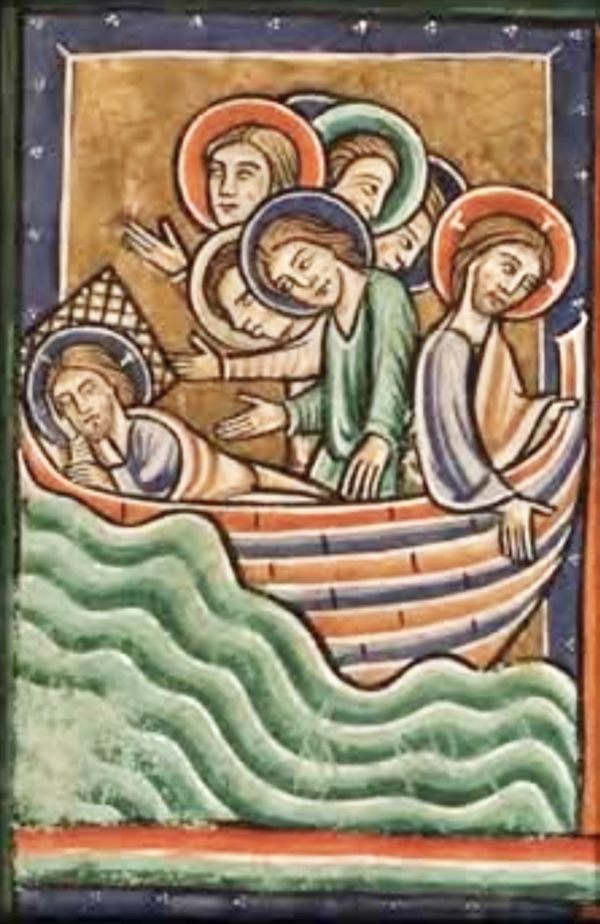(Mk 4:35-41)
The whole Gospel of Mk is an articulated answer to the question: ‘who is Jesus?’ (v.41). His direction of travel seems to the wrong direction, and brazenly breaks the rules accepted by all.
While the disciples caressed nationalist desires, the Master begins to make it clear that He is not the vulgarly awaited Messiah, restorer of the late empire of David [or the Caesars, in succession struggle under the eyes of Mk’s Roman community: Galba, Oton, Vitellius, Vespasian].
The Kingdom of God is open to all humanity, which in those times of turmoil - torn apart by the civil war after Nero’s follies - sought security, hospitality, points of reference.
Everyone could find a home and shelter there (v.32b).
But some remained insensitive to an overly broad idea of Fraternity. The young Rabbi's proposal displaced them.
The teaching and call imposed on Jesus' intimates is to pass to the other shore (v.35), that is, not to hold back for oneself.
The Father's riches had to be communicated to the pagans.
Yet some “veterans” did not want to know about ‘risky disproportions’. They were calibrated on habits of common religiosity, and a circumscribed ideology of power.
So to exorcise the danger of the mission, they were already trying to take the Master hostage (v.36).
From the very beginning, the resistance to the divine office and the lacerating internal debate that had resulted from it, unleashed great storm in the assemblies of believers.
«And a large wind storm comes and the waves spilled into the boat, so that the boat was already filling up» (v.37).
The storm concerns the disciples, the only dismayed; not Jesus - at the stern, that is, at the helm, driving the boat [v. 38 - and on the «cushion»: it is about the Risen One].
What happens ‘inside’ is not a simple reflection of what happens "outside"! This is the mistake to be corrected.
From the peace of the divine condition that dominates chaos (v.39) the Lord draws attention and reproaches the apostles, accusing them of not having «Faith» (v.40).
In short, are we confused, embarrassed, and is the chaos of the schemes raging? Paradoxically, we are on the right path of the Exodus - but we must not get caught up in fear.
Emotionally relevant situations make sense, carry a meaningful appeal, introduce a different introspection, the decisive change; a new 'Genesis'.
Trial in fact activates souls in the most effective way, because it disengages us from the idea of stability, and brings us into contact with dormant energies, initiating the ‘new dialogue with events’.
In Him, we are therefore imbued with a different vision of danger.
Indeed, it seems that Jesus expressly wants the “dark moments” of confrontation and doubt (v.35).
Textbook expectations and the habit of setting up conformist harmonies block the flowering of what we are and hope for.
What is annoying or even ‘against’ has something decisive to tell us.
So even in the little boat of the churches (v.36) the discomfort must express itself.
Ours is an inverted, upside down, unequaled stability - uncertain, inconvenient - yet energetic, capable of reinventing itself.
It will even be excessive, but from the disruptions. And observing in others our own dark sides.
For a proposal of Tenderness without a plan, not corresponding; wich is not a relaxation area.
Love that rhymes with terrible anxiety, which however puts us in immediate contact with our deepest layers - and the ‘suburbs’!
[12th Sunday in O.T. (B) June 23, 2024 (Mk 4:35-41)]












